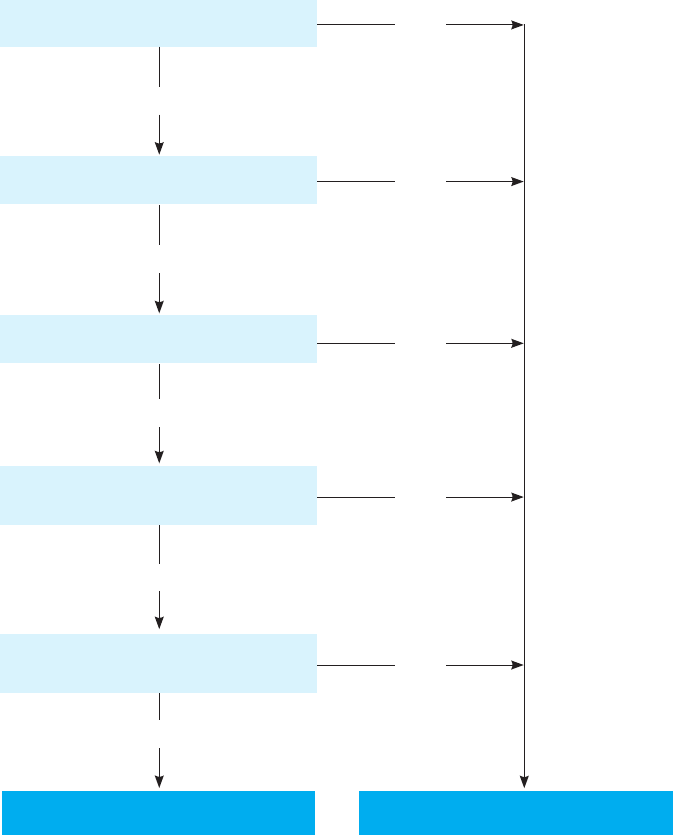
240 CHAPTER 10 FUNDING THE BUSINESS
Debt or equity?
Along the way, I have assumed that you will use trade credit as and when it is available.
Your choice for your excess cash requirement is to fund it by borrowing or by increasing
the owners’ capital. The owners might be a sole proprietor, partners or shareholders. The
jargon varies, so from now on I will refer to loan capital as debt and to owners’ capital as
equity. With that out of the way, what difference does it make whether the funding comes
from debt or equity?
COMPARING DEBT AND EQUITY
Debt is repayable
Lenders are very demanding. They are concerned mainly with security and cash flow.
They usually lend to you only if you own more than you owe (so that they can seize your
assets if you default on repayment) and if you can prove that you can definitely afford to
pay it back. The main cost to you is the interest charge.
Equity is not repayable
Shareholders recover their capital in one of two ways. Either the business goes to the
wall and shareholders take the final pickings after all other creditors have been settled.
Or the shareholders unlock value by selling their shares to another investor. We should
assume that you do not want to close your business. The alternative then is to run a suc-
cessful company so that the amount that people are prepared to pay for your shares
increases. Shareholders can then sell their shares at a premium. You usually have to keep
them happy along the way by giving them dividends (sharing out a bit of annual profit as
pseudo interest payments). As shareholders are the owners of the company, those with a
high proportion of the shares usually want a say in how it is run. A shareholder – or group
of shareholders – with a dominant stake can force majority decisions. The cost, then, is
mainly an obligation to be good managers and a loss of ownership and control.
I said that lenders are very demanding. It sounds as if shareholders are worse. The big
difference is in the cash flow.
Debt is a burden – repayments of principle and interest drain your cash
flow. Equity does not necessarily involve parting with any cash – even the
dividends can be deferred until better cash flow days. Moreover, equity
investors accept higher risk in exchange for better returns in the future. This means
that you can persuade backers to swap their cash for your shares when the bankers
are sucking in their breath and shaking their heads. But while the cash flow effect of
equity is far less painful, the overall cost is actually greater than that of debt.

DEBT OR EQUITY? 241
Why is the cost of equity greater than the cost of debt? Follow through these simple
arguments.
1 Your investors are looking for a return on equity that is greater than the rate of
interest that they could earn on a lower-risk investment.
2 Your debt is secured against assets and cash flow, so your debt must be a lower
risk than your equity.
3 Therefore, logically, your equity must produce a higher return than the interest
rate that you pay on your debt. If it did not, shareholders would desert you.
Put another way, you increase the return on equity by leveraging it and using it to help you
borrow at a lower cost.
I do not know about you, but sometimes I find that simple logic can be very demanding.
It gets easier now.
CHOOSING DEBT FROM EQUITY
The relative merits of debt and equity are compared below. To a large extent, the choice
is dictated by circumstances. Figure 10.6 provides a simplistic decision chart. If you have a
good track record, security for a loan, adequate cash flow, and a not-undue burden of exist-
ing debt you might be able to borrow more. Otherwise, you might be forced to look for
equity – especially if you are in a start-up situation with few assets and a higher-risk venture.
Of course, you may also decide that your particular circumstances make equity prefer-
able even if you could justify increasing your debt. In particular, if you sell some of your
own shares you can unlock some of the value that you have created in the business and
treat yourself to a vacation or a new executive jet.
When you increase the proportion of your debt (relative to your equity),
your overall cost of capital falls. If you earn the same profits for a lower
amount of equity capital, the return on equity (profit divided by equity)
must increase.

242 CHAPTER 10 FUNDING THE BUSINESS
Figure 10.6 Choosing debt from equity
Are you starting a new business?
Do you already have a high proportion of
borrowing relative to equity?
Is repayment of the funding dependent on
the success of a high-risk undertaking?
You will probably be able to borrow You should be looking for equity
NO
NO
NO
YES
YES
YES
YES
YES
Do you have, or will you have,
unencumbered fixed assets with a value
that exceeds the required funding?
NO
Do you have, or will you have,
clearly identifiable cash flow
that will repay the funding?
NO

DEBT OR EQUITY? 243
FINDING FUNDING
Having decided whether you need debt or equity funding, where do you look for it?
Figure 10.7 shows common sources with a crude indication of the likelihood of extracting
the required funds from each, depending on your stage of development. These stages –
start-up, early operations, growth, maturity and recovery from crisis – equate very loosely
with the amount of risk for the provider of funds. The earlier and late stages tend to be
riskier. The table also has an even more tongue-in-cheek identification of the associated
quality of assets – start-ups tend to have fewer tangible assets than mature companies.
Start-up equity
The indications of the likelihood of receiving backing from these sources are also tainted
by my cynicism – based on experience.
For example, venture capital providers are supposed to exist to pour equity into
start-up situations, but their definition of start-up seems to be ‘a well-developed
product and full order book’.
Business partners – including big companies that would benefit from your
invention – are also remarkably inept at grasping opportunities.
In my opinion, you are more likely to find pure start-up capital from working
partners and angels. Angels (sometimes known as the Three Fs – family, friends
and fools) are people you can persuade to invest their spare cash in your business.
The term ‘Angels’ comes from the original sponsors of Broadway shows.
Debt and equity compared
Debt Equity
Lenders are risk averse Equity investors accept higher risk
No loss of ownership Involves giving up some ownership
No explicit loss of control May reduce control
Has to be repaid Does not have to be repaid
Increases demands on cash flow Exerts smaller demands on cash flow
Reduces cost of capital Increases cost of capital
Increases return on equity Reduces return on equity

244 CHAPTER 10 FUNDING THE BUSINESS
Figure 10.7 Sources of funds
Quality of assets
Mainly intellectual Mainly fixed
Risk
High Low High
Stage of growth
Start-up Early days Growth Maturity Recovery
Equity
Family and friends
Angels
Venture capital
Fellow directors
Joint ventures
Misc corporate
Suppliers
Channels to market
Institutional investors
Investment companies
Public offerings
Takeovers
Debt
Family and friends
Angels
BS/S&L
MBO
Commercial credit co’s
Factors
Government agencies
Banks
Institutional investors
Investment companies
Public offerings
Leasing
Other
Research grants
Private foundations
Licensing
Source of funds
Any existing funding mainly equity No existing funding, or mainly debt
Lower-risk activities
Higher-risk activities
Will they provide funds?
BS/S&L = building societies/savings and loans associations; MBO = management buyouts
Unlikely Possible Likely
..................Content has been hidden....................
You can't read the all page of ebook, please click here login for view all page.
